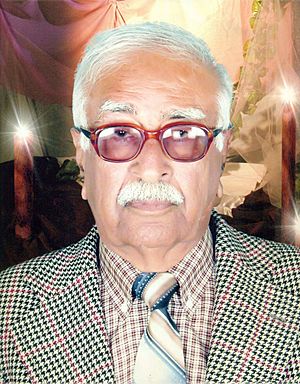Mir Hazar Khan Khoso facts for kids
Quick facts for kids
Mir Hazar Khan Khoso
|
|
|---|---|
|
میر ہزار خان کھوسو
|
|
 |
|
| Caretaker Prime Minister of Pakistan | |
| In office 25 March 2013 – 5 June 2013 |
|
| President | Asif Ali Zardari |
| Preceded by | Raja Pervaiz Ashraf |
| Succeeded by | Nawaz Sharif |
| Minister of Foreign Affairs Caretaker |
|
| In office 4 April 2013 – 4 June 2013 |
|
| Preceded by | Hina Rabbani Khar |
| Succeeded by | Nawaz Sharif |
| Minister of Finance Caretaker |
|
| In office 4 April 2013 – 4 June 2013 |
|
| Preceded by | Saleem Mandviwalla |
| Succeeded by | Ishaq Dar |
| Minister of Defence Caretaker |
|
| In office 5 April 2013 – 4 June 2013 |
|
| Preceded by | Naveed Qamar |
| Succeeded by | Nawaz Sharif |
| Chief Justice of the Federal Shariat Court | |
| In office 17 November 1992 – 18 July 1994 |
|
| Personal details | |
| Born | 30 September 1929 Goth Azam Khan, Sibi District, Balochistan, British India |
| Died | 26 June 2021 (aged 91) Quetta, Balochistan, Pakistan |
| Cause of death | Myocardial infarction |
| Political party | Independent |
| Alma mater | University of Sindh University of Karachi |
Mir Hazar Khan Khoso (Urdu: میر ہزار خان کھوسو) was an important Pakistani judge and politician. He was born on September 30, 1929, and passed away on June 26, 2021. He is best known for serving as the caretaker prime minister of Pakistan for a short time in 2013. A caretaker prime minister leads the country temporarily to make sure elections are fair and smooth. Before this, he was a top judge, including the Chief Justice of the Federal Shariat Court.
Contents
Early Life and Education
Mir Hazar Khan Khoso was born in a village called Goth Azam Khan. This village is in the Jaffarabad District of Balochistan Province, Pakistan. He was born on September 30, 1929. As a young person, Khoso was very involved in the Pakistan Movement. This was a big effort to create the country of Pakistan. He looked up to Muhammad Ali Jinnah, who was a key leader in this movement. Khoso belonged to the Baloch ethnic group.
He went to the University of Sindh in 1950 and earned his first degree in 1954. Two years later, he got a law degree from Karachi University. He also taught law at Government Law College in Quetta, Balochistan.
A Career in Law and Justice
Khoso started his career as a lawyer in 1957. He worked in the Sindh High Court in Karachi. Later, in 1980, he became a lawyer for the Supreme Court of Pakistan.
In 1977, he was chosen to be a judge at the Balochistan High Court. He served there for two years. He returned as a judge in 1985 and became a permanent judge in 1987. In 1989, he became the chief justice of the Balochistan High Court.
Khoso also served as the Governor of Balochistan twice, but for short periods. He was governor from June 25 to July 12 in 1990. Then, he served again from March 13 to July 13 in 1991.
After retiring from his judicial service, Khoso was appointed as a judge of the Federal Shariat Court. This court makes decisions based on Islamic law. He started this new role in 1991. The next year, he was promoted to chief justice of the Shariat Court. He held this position until 1994. Khoso also led the Balochistan Zakat Council. This council helps collect and distribute charity according to Islamic principles. He worked hard to help girls get an education.
Serving as Caretaker Prime Minister
On March 24, 2013, the Election Commission of Pakistan (ECP) chose Khoso to be the caretaker Prime Minister of Pakistan. He was selected from a list of four people. He took his oath of office on March 25, 2013.
The Caretaker Cabinet
On April 2, 2013, Khoso's temporary government, called the caretaker federal cabinet, was formed. It had fourteen members. President Asif Ali Zardari officially swore them in. This temporary cabinet included ministers like Arif Nizami and Dr. Sania Nishtar. The ministers came from different parts of Pakistan. This caretaker government worked until the new government took over after the general elections in May 2013.
See also
- Pakistan
- Election Commission of Pakistan
 | Janet Taylor Pickett |
 | Synthia Saint James |
 | Howardena Pindell |
 | Faith Ringgold |

